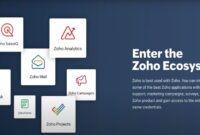Mailchimp Integration with CRM for Enhanced Customer Management – Businesses may integrate Mailchimp with CRM software to share data and automate procedures. Customer segmentation, targeted email campaigns, and customer analytics improve with this integration.
Mailchimp and CRM integration automates marketing and sales, allowing organizations to nurture leads, track customer interactions, and learn customer behavior. Businesses can create targeted, successful marketing campaigns that boost conversions and strengthen customer connections by combining Mailchimp’s email marketing and CRM’s customer data management capabilities.
This post will discuss how Mailchimp integration with CRM can improve marketing and sales efforts. We’ll also walk you through integrating Mailchimp with common CRM solutions to ensure a smooth setup.
The Ultimate Guide to Mailchimp Integration with CRM for Enhanced Customer Management
Integrating Mailchimp, a popular email marketing platform, with a CRM (Customer Relationship Management) system offers numerous benefits for businesses seeking to enhance their marketing and sales strategies. Let’s explore six key aspects of Mailchimp integration with CRM:
- Seamless Data Sharing:
- Targeted Email Campaigns:
- Improved Customer Segmentation:
- Automated Workflows:
- Enhanced Customer Insights:
- Streamlined Marketing and Sales:
By leveraging these aspects, businesses can create highly personalized and effective marketing campaigns that drive conversions and build stronger customer relationships. For instance, integrating Mailchimp with Salesforce allows businesses to segment their email lists based on customer demographics, behaviors, and preferences. This enables them to send targeted emails that resonate with each segment, increasing engagement and conversion rates.
Seamless Data Sharing
Integrating Mailchimp and CRM requires seamless data sharing to send customer data between the two platforms. Real-time data synchronization gives marketing and sales teams the latest customer data, enhancing cooperation and campaign performance.
- Centralized Customer Data:Integration eliminates data silos by creating a centralized repository of customer information, accessible to both marketing and sales teams. This ensures that everyone has a complete view of the customer, including their preferences, purchase history, and communication history.
- Automated Data Updates:When customer data is updated in either Mailchimp or the CRM, the changes are automatically reflected in both systems. This eliminates the need for manual data entry and reduces the risk of errors, ensuring that teams are always working with the most accurate information.
- Improved Data Quality:By consolidating customer data into a single source, businesses can improve its quality by eliminating duplicates, correcting errors, and enriching it with additional information from both Mailchimp and the CRM.
- Enhanced Campaign Performance:Seamless data sharing enables businesses to create highly targeted and personalized email campaigns based on the latest customer information. This leads to increased engagement, improved conversion rates, and stronger customer relationships.
In summary, seamless data sharing between Mailchimp and CRM empowers businesses with a comprehensive and up-to-date view of their customers, allowing them to make better decisions, create more effective marketing campaigns, and deliver personalized customer experiences.
Targeted Email Campaigns
Targeted email campaigns are a crucial aspect of effective email marketing, and Mailchimp integration with CRM plays a vital role in enabling businesses to create and deliver highly personalized emails that resonate with their target audience. Here are four key facets of targeted email campaigns in the context of Mailchimp integration with CRM:
- Segmentation and Personalization:Mailchimp connection with CRM lets businesses segment email lists by demographics, activity, and preferences. Marketers may tailor email campaigns to each segment’s requirements and interests, increasing engagement and conversion rates.
- Automated Workflows:Automation lets organizations send email campaigns based on client behavior. New subscribers can receive a welcome email series, and inactive customers can receive a re-engagement campaign. This automation nurtures leads and strengthens customer relationships by sending the correct message to the right person at the right time.
- A/B Testing and Optimization:Mailchimp CRM integration allows A/B testing of email subject lines, content, and calls-to-action. Marketers use data to optimize campaigns for optimal open, click-through, and conversion rates.
- Performance Tracking and Analytics:CRM integration enables businesses to track the performance of their email campaigns and gain valuable insights into customer engagement. By analyzing metrics such as open rates, click-through rates, and conversions, marketers can identify what’s working and what’s not, and make data-informed decisions to improve future campaigns.
In conclusion, Mailchimp integration with CRM lets organizations send personalized email campaigns that increase engagement, conversions, and customer loyalty. Businesses can build stronger relationships and achieve their marketing goals by using segmentation, automation, testing, and analytics to create tailored email experiences that resonate with their target audience.
Improved Customer Segmentation
Effective marketing and sales tactics require better customer segmentation. Businesses can create highly targeted and individualized marketing efforts that meet each segment’s demands and interests by splitting clients by shared traits. Mailchimp integration with CRM improves customer segmentation and helps organizations design more effective marketing campaigns and get better results.
- Data-Driven Segmentation:CRM connection with Mailchimp lets organizations use customer demographics, purchase history, engagement data, and more. This data can be utilized to generate very granular client segments to adapt marketing messages to their unique traits and habits.
- Automated Segmentation:Integration with CRM enables automated segmentation, allowing businesses to dynamically create and update customer segments based on pre-defined rules and triggers. This automation ensures that customer segments are always up-to-date, reflecting the latest customer data and behaviors.
- Multi-Channel Segmentation:Mailchimp integration with CRM gives a complete view of customer interactions via email, website, social media, and more. This lets firms categorize customers by multi-channel behavior to ensure consistent and relevant marketing efforts across all touchpoints.
- CRM Integration Benefits:Mailchimp-CRM integration improves client segmentation. CRMs store customer data such sales history, support interactions, and preferences. Mailchimp may use CRM data to build more focused customer segments.
In conclusion, Mailchimp integration with CRM allows organizations to segment customers and develop focused, personalized marketing campaigns that produce results. Businesses can generate detailed, meaningful customer segments by using a lot of customer data, automating segmentation, and considering multi-channel interactions, improving marketing effectiveness and customer connections.
Automated Workflows
Automated workflows are a powerful aspect of Mailchimp integration with CRM, enabling businesses to streamline their marketing and sales processes, improve customer engagement, and drive better results. Here are four key facets of automated workflows in the context of Mailchimp integration with CRM:
- Welcome and Onboarding Sequences:Automated welcome sequences can be triggered when a new subscriber joins your email list or makes a purchase. These sequences can include a series of emails designed to welcome the new subscriber, provide valuable information about your products or services, and encourage them to take further actions, such as visiting your website or making another purchase.
- Lead Nurturing Campaigns:Automated lead nurturing campaigns can be used to engage and educate potential customers over time. These campaigns can include a series of emails that provide valuable content, such as blog posts, whitepapers, or case studies, and are designed to move leads through the sales funnel at their own pace.
- Re-engagement Campaigns:Automated re-engagement campaigns can be used to reconnect with inactive subscribers or customers. These campaigns can include a series of emails designed to re-engage these individuals, offer incentives for returning to your website or making a purchase, and remind them of the value you offer.
- Transactional Emails:Automated transactional emails are triggered by specific actions, such as a purchase, account creation, or password reset. These emails are typically used to provide important information or confirmations to customers, such as order confirmations, shipping notifications, or invoices.
By leveraging automated workflows, businesses can automate repetitive tasks, save time, and improve the customer experience. Automated workflows can also help businesses track customer behavior and engagement, providing valuable insights that can be used to improve marketing and sales strategies.
Enhanced Customer Insights
Mailchimp integration with CRM helps firms analyze consumers’ behavior, preferences, and needs by improving customer insights. Businesses can collect, analyze, and use customer data to build tailored marketing campaigns, improve customer care, and expand by combining Mailchimp’s email marketing with CRM’s customer data management tools.
Mailchimp-CRM connection lets you measure client interactions across channels. Businesses may detect trends, preferences, and pain issues by seeing how customers interact with their brand. Integrating Mailchimp with Salesforce lets organizations measure client email interaction, website behavior, and purchase history for a complete customer experience.
Mailchimp integration with CRM lets organizations segment customers by demographics, activity, and preferences. This segmentation lets companies create targeted, relevant marketing strategies that meet each segment’s needs. Mailchimp’s segmentation features can be used to send tailored emails to clients who have abandoned their shopping carts, giving discounts or incentives to buy.
In conclusion, Mailchimp integration with CRM improves customer insights, helping organizations understand their consumers’ behavior, preferences, and needs. Businesses may tailor marketing, improve customer service, and grow by using this data.
Streamlined Marketing and Sales
Mailchimp integration with CRM plays a vital role in streamlining marketing and sales processes, enabling businesses to automate tasks, improve collaboration, and drive better results. Here are four key facets of streamlined marketing and sales in the context of Mailchimp integration with CRM:
- Centralized Customer Data:Integration centralizes customer data for marketing and sales teams, eliminating data silos. This shows everyone the customer’s preferences, purchasing history, and communication history. Centralized data improves coordination, minimizes redundancies, and provides a comprehensive customer journey view.
- Automated Workflows:Automation streamlines repetitive activities and boosts efficiency. Integration lets you automate workflows to send welcome emails to new subscribers or reminders to inactive customers based on customer behavior or events. This automation allows marketing and sales teams to focus on key projects and ensures a consistent and timely client experience.
- Improved Communication:Integration improves communication between marketing and sales teams by providing a shared platform for tracking customer interactions and sharing insights. This shared platform ensures that both teams are working with the same up-to-date customer information and can collaborate more effectively to nurture leads and close deals.
- Enhanced Reporting and Analytics:Integration provides enhanced reporting and analytics capabilities that enable businesses to track the performance of marketing and sales campaigns and measure their impact on revenue. This data-driven approach allows businesses to identify areas for improvement, optimize their strategies, and demonstrate the ROI of their marketing and sales efforts.
In summary, Mailchimp integration with CRM streamlines marketing and sales processes, leading to improved collaboration, increased efficiency, and better results. By leveraging the power of a centralized customer data repository, automated workflows, enhanced communication, and robust reporting, businesses can streamline their operations and drive business growth.
Mailchimp Integration with CRM
Mailchimp integration with CRM is a valuable tool for firms looking to streamline marketing and sales and boost customer engagement. Businesses can easily share data, generate targeted email campaigns, segment their audience, automate procedures, and obtain customer insights by using both platforms. This connection helps firms improve customer interactions, convert, and meet marketing and sales goals.
Integrating marketing and sales technologies can help firms prosper as the digital world evolves. Mailchimp integration with CRM helps organizations stay ahead, personalize customer experiences, and flourish.



